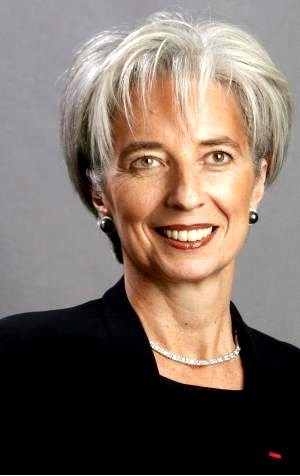A nation that lets nationalism govern its people is doomed to be overrun by oligarchs. Nationalism, by definition is emotional and emotions cannot be the cornerstone for sound policy. If a political issue has to be solved by the State, which I think is a misnomer, then truth, an informed public, and intelligent debate have to be the driving factors behind any laws or state actions.
"South African, Russian and South Korean officials have called for a candidate from an emerging market, while Brazil indicated it won’t push for the switch. China’s government asked for a 'fair and transparent process'. ---
German Chancellor Angela Merkel said May 16 there are “good reasons” for Europe to keep the top job. She was echoed that day by Belgian Finance Minister Didier Reynders, and by his counterparts Borg of Sweden, Jan Kees de Jager of the Netherlands and Elena Salgado of Spain yesterday."
 This divide between Emerging Market nations on the one hand, versus the European Union on the other paints clearly the inherent problem with international governing bodies, and governing institutions in general. You are always going to have a constituency that is being given to and you are always going to have a constituency that is taking from. With Portugal earlier this month being approved a $36.8 billion loan, and with Greece unable to deliver fiscal austerity (big surprise), it is only natural for the European nations to call for greater control of their finances. As of this moment, it appears as if France's finance minister Christine Lagarde will be replacing Mr. Kahn. More from Bloomberg:
This divide between Emerging Market nations on the one hand, versus the European Union on the other paints clearly the inherent problem with international governing bodies, and governing institutions in general. You are always going to have a constituency that is being given to and you are always going to have a constituency that is taking from. With Portugal earlier this month being approved a $36.8 billion loan, and with Greece unable to deliver fiscal austerity (big surprise), it is only natural for the European nations to call for greater control of their finances. As of this moment, it appears as if France's finance minister Christine Lagarde will be replacing Mr. Kahn. More from Bloomberg:"South African Finance Minister Pravin Gordhan in an interview today said Trevor Manuel, his predecessor, is 'highly respected in the world' and that the country is already in talks with other developing economies on a possible candidate.
Bank of Korea Governor Kim Choong Soo in Seoul today said he hoped 'this will be an opportunity for a country in the emerging economies to take the post.'
Emerging markets 'have every right to compete for leading positions in international organizations,' Russia’s central bank Deputy Chairman Sergei Shvetsov said. His country in 2007 nominated a former Czech prime minister to counter Strauss- Kahn’s candidacy."The Economist a few days ago, echoed my sentiment somewhat:
But it [Christine Lagarde] is still wrong. To begin with, the stitch-up, whereby the head of the IMF is a European and the head of the World Bank is an American, is a disgrace. International posts should be filled according to merit. And the growth of emerging economies makes it even less defensible.
Moreover, the case against appointing a euro-zone finance minister as head of the IMF now is overwhelming. The main issue facing the fund is the euro zone. The fund is supposed to be an impartial arbiter of good economic policy. It is the only organisation likely to force a rethink of the euro zone’s failed strategy towards Greece, Ireland and Portugal.This is still a divergence from my line which says that the nationality of the successor should not even be part of the discussion whereas the Economist is pushing for a non-Euro zone candidate. They are certainly right in that Euro zone candidates, especially Largarde, are likely to push for more bailouts for European debt-laden countries, but this type of discrimination almost perpetuates the idea that leaders should be selected based off the same feelings espoused by nationalist sentiment. It predicates the idea that you can't debate ideas and their merits by tying a nationality to a predisposed policy destined to serve that nation's interest. In the case of the new IMF chief, the discussion is a product of what I first heard Nigel Farage describe as "EU nationalism".
Robert Wenzel points out that all the Economist candidates are either insiders, banksters, or both. What I think would be beneficial is if the dialogue focused more on the prevention of bailouts (robbery), and how the debt-laden nations will actually pay down their debts and cut their deficits. The fact that Greece is in the news again a year after they're initial bailout was approved shows the extreme lack of wisdom of the elites that run the IMF. The conversation and subsequent policy needs to be moved towards no bailouts and no loans. It's bad enough that government finances are carried by the backs of taxpayers. And even worse that government finances are carried by the backs of taxpayers in other countries.
The same nationalism was witnessed earlier this month after President Obama ordered the assassination of Osama bin Laden. Hysterical chants of U.S.A.! filled the streets in D.C. and other cities. Left ignored were questions of bin Laden's guilt in the 9/11 attacks which was never proven. Questions over the violation of Pakistani sovereignty. Questions over assassinating un-armed people without giving them due process. Questions over the deaths of the other four people in the house during the raid. Questions about our war with Afghanistan and covert war with Pakistan. The fact that very few people ask these questions and search for their answers reflects vividly the integrity behind the "freest nation on Earth" and goes to show that American nationalism is about as blind as pure devotion to a sports team.
Nothing though, shouts blind nationalism like this video:


No comments:
Post a Comment